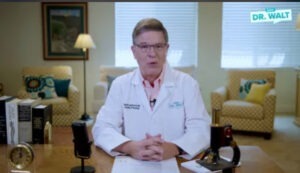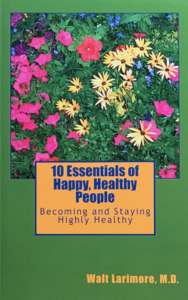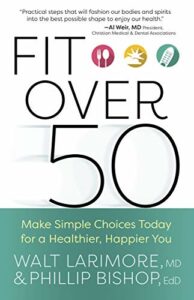Ask Dr. Walt 14 – Essential #7 – The essential of a positive self-image OR How to see yourself as your Creator sees you

My father – My hero and now an Army 3rd Infantry Division hero
August 4, 2023
Colorado Springs man discovers father’s WWII story
August 9, 2023Ask Dr. Walt 14 – Essential #7 – The essential of a positive self-image OR How to see yourself as your Creator sees you
Did you know your self-image, or lack thereof, can have a direct effect on your physical and emotional health, as well as your overall well-being? We’ll uncover how you can see yourself the way your Creator does on today’s episode of Ask Dr. Walt.
From 2021-2022, I was honored to host a TV show on LiftableTV, “Ask Dr. Walt.” In this series, I’m explaining the 10 key habits or 10 essentials of happy, healthy people.
Did you know your self-image, or lack thereof, can have a direct effect on your physical and emotional health, as well as your overall well-being? We’ll uncover how you can see yourself the way your Creator does on today’s episode of Ask Dr. Walt: Essential #7 – The essential of a positive self-image OR How to see yourself as your Creator sees you.
You can click below to watch a video of the show, or I’ve put the show transcript at the end of the blog if you’d prefer that.
You can learn more about this topic in my best-selling book, 10 Essentials of Happy, Healthy People: Becoming and staying highly healthy or Fit over 50: Make Simple Choices for a Healthier, Happier You.
CLICK HERE FOR 10 E’S CLICK HERE FOR Fo50
Disclaimer: The Ask Dr. Walt show is designed for entertainment purposes to give information on various medical conditions, treatments, and procedures for your personal knowledge and to help you be a more informed consumer of medical and health services.
SHOW TRANSCRIPT
TEASE:
Did you know your self-image, or lack thereof, can have a direct effect on your physical and emotional health, as well as your overall well-being? We’ll uncover how you can see yourself the way your Creator does on today’s episode of Ask Dr. Walt.
OPEN:
Hi, everyone. I’m family physician Dr. Walt Larimore and I’m pleased you are taking the time to join me in my home office as we continue our discussion about the ten essentials of becoming and staying healthy physically, emotionally/mentally, relationally, and spirituality. WE’VE ALREADY COVERED the essentials of:
- True health
- Self-care
- Reducing SADness
- Forgiveness
- Relationships and
- Spiritual health
TODAY WE’LL COVER:
- Positive Self-image or Seeing Yourself as Your Creator Sees You
IN FUTURE SHOWS WE’LL COVER the essentials of
- Discovering your destiny
- Personal responsibility and
- Teamwork in healthcare.
Those of you who watch this show know that I’m not some sort of self-help guru. Rather, I want you to learn about being healthy in ways that are medically reliable and biblically sound. Today I want to explain why your self-image is so critical to your health.
Image is dependent upon perspective. For example, poor vision or a cloudy mirror can greatly affect how we perceive ourselves. Without an objective standard by which to measure ourselves, our self-image will be blurred. The Bible provides guidance regarding the appropriate view of our self-image. It teaches in Genesis 1:26–27 that all people are created in the image of God. Because of this, each person is of great worth and value. The Bible also teaches that all people are greatly loved by God. God’s love also gives us worth and value.
Is that the image you have of yourself? That you carry the image of God in yourself and that you are greatly loved by him. In fact, there is nothing you can do to make him love you more. Do you believe these biblical truths?
According to the Cleveland Clinic, “Self-image is the personal view, or mental picture, we have of ourselves.”[i]Mayo Clinic experts write, “Self-esteem affects virtually every facet of your life. Maintaining a healthy, realistic view of yourself isn’t about blowing your own horn. It’s about learning to like and respect yourself—faults and all.”[ii] I would tweak that to say that maintaining a healthy, realistic, and biblical view of yourself is about learning to love yourself the way your Creator does—warts and all.
I want to thank those who sent in your questions for this show. I can’t answer them all, but appreciate Kylie and Jordan helping me to sort through them and put them in order. At the end of this show, I’ll tell you how to send in your questions for future shows. So, let’s dive into some of the science and theology behind nurturing a positive self-image.
1) Our first question comes from Jake in Jacksonville, Florida. Dr. Walt, I imagine a poor self-esteem impacts emotional and mental health the most, right?
Jake, that’s correct. In fact, researchers at Syracuse University reported that “Low self-esteem predicts more negative affect, less positive affect, greater stress severity, and greater symptom severity in daily life.” They go on to say that “There are a number of health benefits to a healthy self-esteem.”[iii]
The Henry Ford Health System says there are at least six emotional, mental, and physical benefits of a healthy self-esteem:[iv]
- Your expectations are more in line with reality, and as a result, you’re less critical of yourself and others.
- You’re better able to handle stress (and avoid the unhealthy side effects that come with it).
- You’re not as likely to battle feelings of worthlessness, guilt, or shame.
- You can build strong, honest relationships (and are less likely to stay in unhealthy ones).
- You have greater confidence in your ability to make good decisions.
- You bounce back more easily when it comes to life’s inevitable setbacks.
2) Jasmine from Toledo, Ohio, asks, “Does low self-esteem impact our physical health?”
It does. A positive outlook on life and self-image improves the quality of life and prolongs its length. Researchers have found solid evidence that looking on the bright side can both reduce the incidence heart disease and minimize its consequences.
In fact, in one high-risk population with a family history of heart disease, researchers found that a positive self-image was associated with nearly a one-third reduction in coronary disease. And it increased to a nearly 50 percent reduction in those with the strongest family history. In people at lower risk for heart disease, even independent of all other traditional heart disease risk factors, a positive self-image predicted a 13 percent reduction of cardiovascular disease.[v]
3) Gracie in Reno Nevada writes, “I have grand and great grandparents with both dementia and very poor self-images. Are the two related? Could I be at genetic risk for both?
Gracie, in a previous program I explained how a nutritious diet, such as a Mediterranean diet, as well as exercise and physical fitness, could dramatically reduce the risk of dementia in people with a high genetic risk as well as in people with a reduced risk. But you’ll be glad to know that Yale scientists in 2018 reported that older people who “carried a gene linked to dementia but also had very positive attitudes about aging were 50 percent less likely to develop the disorder than less positive people.” The researchers added, “The results of this study suggest that positive beliefs about aging, which are modifiable and have been found to reduce stress, can act as a protective factor, even for older individuals at high risk of dementia.”[vi]
4) Dylan from Newark, New Jersey, writes, “I’ve noticed that people with a stinky self-image tend to stink up relationships also.”
Dylan, I’ve noticed the same. And so have the scientists. One group reported that positivity can reduce anxiety[vii] and increase feelings of happiness.[viii] It seems clear to me that a healthy self-image and positive attitude can lead to a healthier body, mind, and relationships.
In fact, during my forty years as a family physician, I have cared for many patients who suffered from a poor self-image or outlook on life. Although most don’t die from these maladies, they are diseased from them. In fact, they often suffer terribly—physically, mentally, relationally, and spiritually.
So, for those of you watching, I have a personal question. How do you see yourself? And how do you think your Creator sees you? If you’d grab a pen and piece of paper, or perhaps your journal, I’d like you to do some serious reflection, and write down your answers to the following questions:
- Do I like myself? Why or why not?
- Do I believe I am worthy of love? Why or why not?
- When I think of God, which reaction do I feel most strongly—comfort or discomfort?
- What do I think God thinks of me? What would He say about me and His feelings for me?
- On what do I base my self-esteem? Is it what the Bible says or what people say?
If you don’t like yourself, do not believe you are worthy of love, or do not believe God desperately loves you, let me give you some prescriptions to consider to pump up a deflated self-image. If your self-esteem is low, what can you choose to do to increase your likelihood of becoming highly healthy? Throughout the years, I have developed an advice sheet (a prescription of sorts), to help my patients who suffer from a poor self-image. All five items are supported both biblically and scientifically.
- Place A Personal Relationship with God at the Center of Your Life
As I told you in the program on spiritual health, there is significant scientific evidence that a strong faith in, and personal relationship with, God is associated with a large number of positive mental and physical health outcomes. The Bible teaches that we were each created by a loving God—in His image of this God—and that knowing Him, serving Him, pleasing Him, and worshipping Him will fulfill our primary purpose in life and eternity. In short, we are hardwired to please and to glorify God in all we think, say, and do.
John Piper, in his book Don’t Waste Your Life, writes: The really wonderful moments of joy in this world are not the moments of self-satisfaction, but self-forgetfulness. Standing on the edge of the Grand Canyon and contemplating your own greatness is pathological. At such moments we are made for a magnificent joy that comes from outside ourselves. God created me—and you—to live with a single, all-embracing, all-transforming passion—namely, a passion to glorify God by enjoying and displaying his supreme excellence in all the spheres of life.[ix]
If you want to know how you can have a personal relationship with God starting today, I explain this in a web post of mine titled, “The Most Important Blog I’ve Ever Written.” You can find it at tinyurl.com/MyMostImportantBlogEver.
Once you have a personal relationship with God—once you’re a follower of Jesus, my prescription for you is to
- Read and Memorize Bible Passages Daily
For years I have given my patients an assignment to memorize and meditate on portions of the Bible relevant to a health issue with which they are wrestling. Several studies have shown that people who spend time reading and reflecting on the Bible daily have better health outcomes. One researcher examined the relationship between Bible study and a healthy marriage and concluded, “There was a fairly strong relationship between both prayer and Bible reading and marital adjustment,” and, “A strong commitment to religious practice and ideals can enhance marital stability.”[x]
Other studies have found that daily Bible reading was associated with greater life satisfaction[xi] and greater degrees of hopefulness.[xii] Bible reading also may be associated with a protection against alcoholism[xiii] and depressive symptoms,[xiv] as well as improve many other mental and physical health measures.[xv]
Astonishingly, one’s whole way of thinking can be renewed. In fact, the Bible in Romans 12:2 tells us: “Do not conform to the pattern of this world but be transformed by the renewing of your mind.” A poor self-image can be transformed into positive self-esteem as we discover how much God loves us and how passionately He wants our lives to be full and meaningful. The renewing of our minds is gradual process, and it can be enhanced by reading, memorizing, and meditating on the Bible.
- Spend Time in Meditation and Prayer Daily
Prayer and times of solitude are high priorities in the lives of very healthy people. Prayer is simply conversing with God. Meditation is purposefully concentrating and listening with our spiritual ears to what God has already said in Scripture and what His Spirit communicates to our spirits during our conversation with Him.
Again, studies have also shown a positive correlation between activities such as prayer and Bible reading and satisfaction in life.[xvi] This is especially true when pray centers on worship, adoration, thanksgiving, and gratitude and NOT just asking for things.
Researchers believe time spent in meditation and prayer—especially when joined with Bible study—takes a person’s focus away from a potentially pathological concentration on self—a focus that not only lowers self-esteem but also reduces life satisfaction and well-being.
By concentrating on ourselves and our problems, while failing to see the bigger picture, we can contribute to our own demise. Investing as little as five to ten minutes a day in meditation and prayer can change you. If you’ve never considered investing time in yourself, now is the time to start. Set your alarm clock fifteen minutes earlier than usual. Get out of bed and enjoy the luxury of time alone—for you and with your Creator.
- Avoid Negative Self-Talk
Being overly critical of ourselves—regularly beating ourselves up—makes for low self-esteem. People can improve their moods, their attitudes, and their overall health by changing the way they think and the things they tell themselves about themselves, life, and God. One large review concluded that while an optimistic attitude does wonders for patients’ recovery, negative attitudes and critical self-talk decrease one’s likelihood of becoming quite healthy.[xvii]
The apostle Paul wrote in Philippians 4:8–9, “Whatever is true, whatever is noble, whatever is right, whatever is pure, whatever is lovely, whatever is admirable—if anything is excellent or praiseworthy—think about such things. Whatever you have learned or received or heard from me or seen in me—put it into practice. And the God of peace will be with you.”
What we think and how we think—and how we talk to ourselves about what we think—has a direct impact on our peace of mind. The type of thinking Paul has in mind improves our moods, our immune functions, and our health.
I cannot overemphasize the importance of these first four prescriptions. Neuroscientists have developed stunning brain scanning technologies, showing how our emotions and thoughts actually can change our brain structure. One clinical psychologist explains it this way: “How and where we focus our attention dictates the content of the brain structure we create. By choosing to focus our attention (mindfulness and prayer) on uplifting emotional content (positivity and hope) and sustaining that for 25 seconds (installation), we little by little change our brain structure, which changes mental activity, which changes biochemical communication in the body, which genetically changes gene expression and thus our physical, mental, and emotional well-being.”[xviii]
In the time we have left, let me give you another prescription we’ve talked about in the past:
- Volunteer and Serve Others
People who have healthy self-esteem are not self-absorbed. Being comfortable in our own skin empowers us to serve and truly give of ourselves to others—just the way Jesus commanded us. People who make serving others a high priority have the greatest likelihood of becoming quite healthy.
Steve Wilson, a psychologist and self-proclaimed “joyologist,” says, “There is a kind of unhappiness that cannot be repaired by getting, because it requires giving. There is a kind of dissatisfaction, disappointment, and absence of joy that is remedied by giving something out, doing something for others. Happiness is an inside job that consists of remembering who you are (precious), finding your source, laughing often, serving with love.”[xix]
Researchers tell us the more people volunteer to help others, the better their health. I want to encourage you to find specific ways you can make serving other people a higher priority. What will you do differently in the month ahead to become healthier in this area?
So, in conclusion, how is your view of yourself? When you look at yourself in the mirror or think about how you’ve lived your life, do you feel positive or negative? Do you feel healthy or unhealthy? If you suffer from a deflated self-image, it’s time to take another look in the mirror. See yourself as God sees you. He designed and created the person you see reflected there. If my prescriptions simply don’t help, let me encourage you to call a pastoral professional. Make an appointment to chat. Tell them Dr. Walt referred you.
The key to a realistic and positive self-image is agreeing with God about ourselves. Henri Nouwen writes of how God might speak to you about how he sees you:
I have called you by name, from the very beginning. You are mine and I am yours. You are my Beloved, on you my favor rests. I have molded you in the depths of the earth and knitted you together in your mother’s womb. I have carved you in the palms of my hands and hidden you in the shadow of my embrace. I look at you with infinite tenderness and care for you with a care more intimate than that of a mother for her child. I have counted every hair on your head and guided you at every step. Wherever you go, I go with you, and wherever you rest, I keep watch. I will give you food that will satisfy all your hunger and drink that will quench all your thirst. I will not hide my face from you. I know you as my own. You belong to me. Wherever you are I will be. Nothing will ever separate us.[xx]
The Bible is clear that you were designed to have a life that is full, meaningful, and infused with a sense of well-being. God designed you to:
- experience and dispense love (rather than loathing),
- experience joy (rather than sorrow),
- experience peace (rather than distress),
- practice patience (rather than pigheadedness),
- practice kindness (rather than meanness),
- practice goodness (rather than hostility),
- practice faithfulness (rather than disloyalty),
- practice gentleness (rather than callousness), and
- practice self-control (rather than instability).
By seeing yourself as your Creator sees you and learning to incorporate His plan and design into how you live and what you do, you will become empowered to live out God’s purpose for your life.
I believe that our Creator has designed us for a specific purpose—and being true to that purpose will result in genuine and lasting joy and satisfaction. Research has shown that only about 25 percent of Americans have a clear sense of purpose[xxi]—and having purpose is linked to:
- better sleep quality,[xxii]
- reduced all-cause mortality and
- reduced cardiovascular events such as fewer strokes and heart attacks,[xxiii]
- improved cognitive function and reduced risk of Alzheimer’s,[xxiv] and
- a lower risk premature death.[xxv]
Regardless of your past—lost jobs or health, broken dreams, failed relationships, etc.—the almighty God, who loves you, has a plan for your life. Seek His face, embrace His love, and don’t stop until His plan for your life is your plan for your life. Nothing else could be more important.
As Jesus said in John 10:10, “A thief is only there to steal and kill and destroy. I came so they can have real and eternal life, more and better life than they ever dreamed of.” (John 10:10 msg).
Well, our time’s up for today. To continue your journey to becoming an extraordinarily healthy person, I hope you will fill some of this program’s prescriptions for health. If you want more information on this health essential, you may be interested two of my best-selling books: Fit over 50: Make Simple Choices for a Healthier, Happier You and 10 Essentials of Happy, Healthy People: Becoming and staying highly healthy. You can find them at DrWalt.com. Just click on the tab that says books.
Also, at DrWalt.com you can sign up for both my daily “Medical News You Can Use” blog and my twice daily Biblical devotion, “Morning Glory, Evening Grace.”
And next time we’ll continue our look at the 10 Essentials of Healthy, Happy People by discussing the essential of discovering your destiny—how to nurture your hopes and dreams.
I’d love to hear from you. What questions do you have about the association of your spiritual health to your physical, emotional/mental, and relational health? Just send an email them to me at DrWalt@Liftable.TV along with any other general health questions you might have. That’s DrWalt@Liftable.TV.
So, until our next visit, “Dear friend, I pray that you may enjoy good health and that all may go well with you, even as your soul is getting along well.” I’m Dr. Walt Larimore and I look forward to seeing you for my next episode of “Ask Dr. Walt.”
[i] tinyurl.com/yd5w575w
[ii] tinyurl.com/yaw2tffs
[iii] tinyurl.com/y8pgdglx
[iv] tinyurl.com/ycsa6fsw
[v] tinyurl.com/y2fj5kv5
[vi] tinyurl.com/y5evevw2
[vii] tinyurl.com/y8f5popl
[viii] tinyurl.com/zfw6aoz
[ix] John Piper, Don’t Waste Your Life (Wheaton, IL: Crossway, 2003), 33-34.
[x] tinyurl.com/y42srxme
[xi] tinyurl.com/yy58ehf5
[xii] tinyurl.com/yyrxzmaj
[xiii] tinyurl.com/yxs7y63k
[xiv] tinyurl.com/y2e4jfwb
[xv] Harold G. Koenig, Dana E. King, and Verna B. Carson, Handbook of Religion and Health 2nd ed. (New York: Oxford University Press, 2012): 125, 151, 160, 163, 166, 173, 332, 355, 366, 368.
[xvi] tinyurl.com/yy58ehf5
[xvii] tinyurl.com/ycl8qdm5
[xviii] tinyurl.com/y43rruoe
[xix] Steve Wilson, “Happiness Is an Inside Job,” quoted in Walt Larimore, 10 Essentials of Happy, Healthy People. (Grand Rapids, MI: Zondervan, 2003), 290.
[xx] Henri J. M. Nouwen, Spiritual Direction: Wisdom for the Long Walk of Faith (New York, NY: HarperCollins, 2006), 32-33.
[xxi] tinyurl.com/y2pd5odf
[xxii] tinyurl.com/yb9q6cq5
[xxiii] tinyurl.com/y3f5xxph
[xxiv] tinyurl.com/y6hxoz4s
[xxv] tinyurl.com/y29ldwkw
[2] tinyurl.com/y7tntsc3
Disclaimer: The “Ask Dr. Walt” show is designed for entertainment purposes to give information on various medical conditions, treatments, and procedures for your personal knowledge and to help you be a more informed consumer of medical and health services.
© Copyright WLL, INC. 2023. This blog provides healthcare tips and advice that you can trust about a wide variety of general health information only and is not intended to be a substitute for professional medical advice, diagnosis, or treatment from your regular physician. If you are concerned about your health, take what you learn from this blog and meet with your personal doctor to discuss your concerns.










